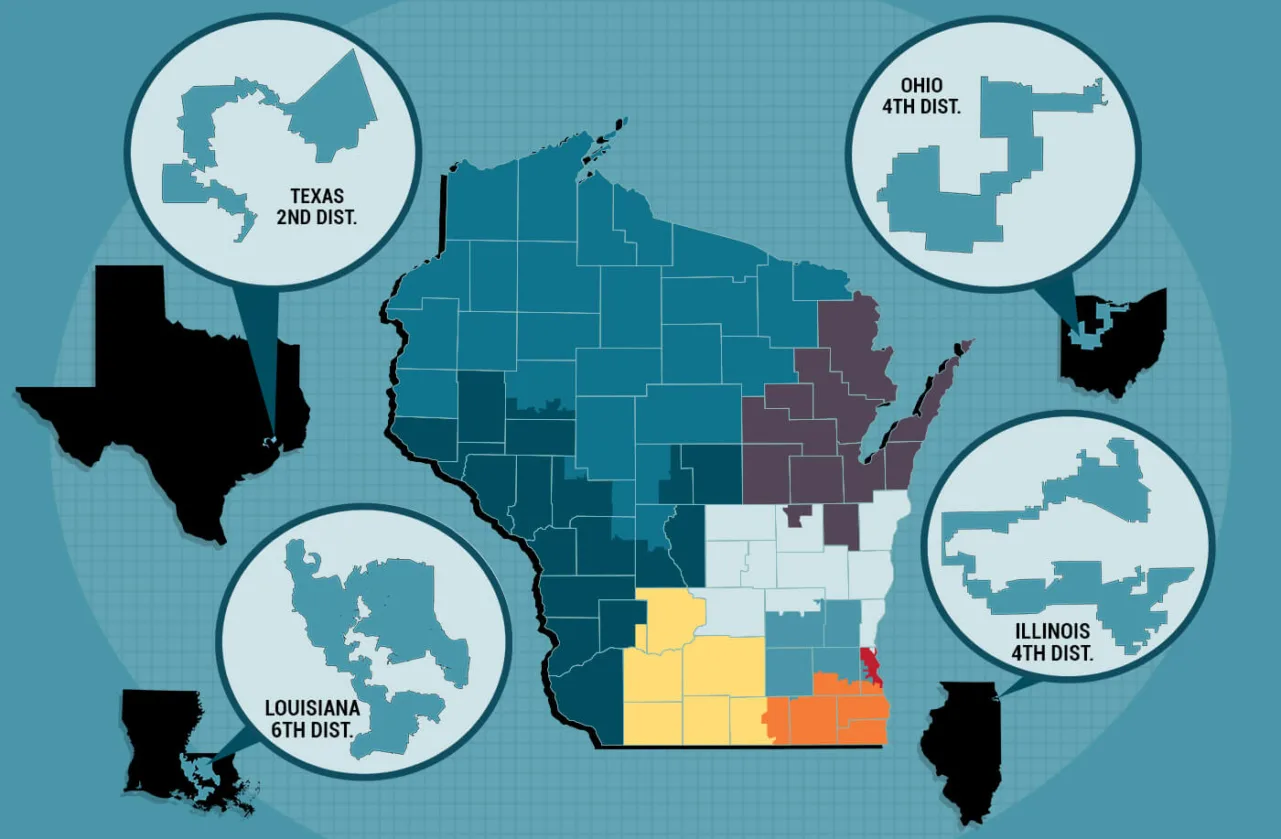
#image_title
Republicans won’t have the map-drawing dominance they had in 2011, but national groups for non-partisan redistricting are still watching closely.
Wisconsin remains a priority state for a Democratic group focused on redistricting that is backed by former President Barack Obama, even though Republicans can’t draw and enact whatever maps they want like they did 10 years ago.
Eric Holder, Obama’s former attorney general who has run the National Democratic Redistricting Committee since it was created in 2017, said in an interview Wednesday that he was “cautiously optimistic” that fair maps could be drawn in Wisconsin this year. But he said those maps would likely come from the result of lawsuits, not any compromise between the Republican-led Legislature and Democratic Gov. Tony Evers.
“The outlook for the possibility of fair maps is better in Wisconsin than it is in Texas,” Holder said. “But Wisconsin is still among the most gerrymandered, or [is] the most gerrymandered, state in the country. And that’s why it remains a state of primary interest.”
Wisconsin Republicans have insisted they will fairly redraw voting districts used for US House and state legislative elections based on the latest US census population figures that states will receive in August and September.
Related: A Congressional District Up North Is the Poster Child of How Gerrymandering Has Rigged Elections
Mark Jefferson, executive director of the Wisconsin Republican Party, said third party groups like the one Holder leads have a long history of doing “dirty work for the Democrats” on redistricting in the state.
“Eric Holder doesn’t want fair maps,” Jefferson said. “He wants maps that are tilted to Democrats’ favor.”
As the once-a-decade redistricting conflicts heat up in Wisconsin and across the country, Republicans and Democrats are wrestling with how far to press their advantages in a fight as consequential as any election. For Republicans, that means building on the success of 10 years ago—even as some population and political trends work against them. For Democrats, it’s a test of their commitment to the changes they’ve long argued are needed to create a level playing field.
Any maps passed by the Wisconsin Legislature would need Evers’ signature. In the likely event of a veto, lawsuits from groups like the one Holder leads are expected, which would put a court in position to approve the maps. Holder’s group has already filed lawsuits in Minnesota, Louisiana, and Pennsylvania asking the courts to begin preparing to redraw maps, in the likely event that their legislature and governor can’t agree on a plan.
Other priority states for the group this year are Arizona, Colorado, Florida, Georgia, North Carolina, Ohio, and Texas.
The NDRC has raised tens of millions of dollars to help elect Democrats and fight Republicans over redistricting over the past four years. It has been active in Wisconsin on a variety of fronts, including spending money on political campaigns and suing Walker in 2018 when he didn’t call special elections for a pair of legislative vacancies.
Wisconsin Democrats, with the help of the NDRC, achieved two of their biggest goals ahead of redistricting this year: winning the governor’s office in 2018 and ensuring Republicans didn’t secure veto-proof majorities in the Legislature in 2020. With Evers able to veto any maps the Republican Legislature passes, Democrats hope for either a compromise that would avoid GOP gerrymandering or more balanced maps approved by courts.
Because Evers can veto the GOP-drawn maps, Wisconsin has not been in the same redistricting spotlight as states where one party controls the entire process. Southern states from Texas to North Carolina are expected to be the premier battlegrounds during this round of redistricting.
In Wisconsin, Evers created a redistricting commission that held hearings across the state and is preparing to release its own map of legislative districts. He also called for nonpartisan redistricting in his state budget, but Republicans have already killed that idea. The Legislature is also not required to consider the maps created by Evers’ commission, which he has touted as nonpartisan but which Republicans have said is designed to help Democrats.
In New York, Democrats are having second thoughts about the nonpartisan redistricting commission there and are looking to make it easier to overrule it so they can draw more favorable district boundaries.
Holder, who supports nonpartisan redistricting commissions and testified at the first meeting of the one in Wisconsin, said Wednesday that he supports following whatever the commission recommends in New York.
Democrats scored a victory last week when the Wisconsin Supreme Court unanimously rejected a Republican-led effort to fast track state lawsuits over redistricting. And a district court judge last month ruled that Republican lawmakers cannot hire attorneys at taxpayers’ expense before any redistricting lawsuits have been filed.
Story by Scott Bauer of The Associated Press

Opinion: Many to thank in fair maps victory for Wisconsinites
On February 19, 2024, Governor Tony Evers signed into law new and fair state legislative maps, bringing hope for an end to over a decade of...

Opinion: Empowering educators: A call for negotiation rights in Wisconsin
This week marks “Public Schools Week,” highlighting the dedication of teachers, paras, custodians, secretaries and others who collaborate with...

Op-ed: Trump’s journey from hosting The Apprentice to being the biggest loser
Leading up to the 2016 election, Donald Trump crafted an image of himself as a successful businessman and a winner. But in reality, Trump has a long...

Not just abortion: IVF ruling next phase in the right’s war on reproductive freedom
Nearly two years after the US Supreme Court overturned Roe v. Wade, another court is using that ruling to go after one of the anti-abortion right’s...




